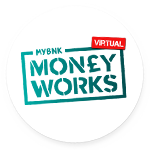
Banks are changing...
 New providers, services and apps.
New providers, services and apps.
We’re going to show you how they work and the new technology making banking smarter so you know what to do before you sign on the dotted line – once that’s done you’ve made a legal agreement.
Bank Accounts
In basic terms, there are two types of account – saving and current accounts.
- Saving accounts are made to store cash and earn interest. They are not meant for everyday spending. While you earn some interest, it’s usually not much and is taxed as well.
- Current accounts are made to give you access to your cash when you need it. They usually come with a debit card and allow you to make payments online, in shops or even on buses and trains. They usually don’t come with interest and if they do, it’s VERY low.
You can also get an ISA – Individual Savings Account. This will allow you to save and earn interest without paying tax on the earned interest. There is a limit on how much you can save in an ISA each year – currently £20,000 – but you can keep this for as long as you want and make tax free interest.
Contracts/Tenancies
Always read any documents BEFORE you sign. By signing, you are agreeing to everything in the contract or tenancy and can’t change your mind later.
Take mobile phone contracts for example. Once you open an account, the provider can make you pay for the whole contract cost even if you try to leave early. If you didn’t read your contract, you may not know this and might get caught out.
Some top tips:
- Ask questions if you’re unsure. Don’t assume that the contract is in your favour – in many cases, it leans towards whoever wrote it.
- If you buy or sign up for anything online, you have 14 days to cancel or return without penalty.
- If you sign anything at your door, different rules apply and you have a 7 day cooling off period in which you can cancel the agreement without penalty.
If you think the other person has broken the terms of the contract (also known as a breach of contract) you should seek specialist help and advice – Citizens Advice can help with issues like this.
Open Banking
 Open banking allows companies access to your banking data in order to offer services or make payments. It’s a lot like when you allow some websites to login with your Facebook details – you would allow a company like Amazon or ASOS to access your bank directly.
Open banking allows companies access to your banking data in order to offer services or make payments. It’s a lot like when you allow some websites to login with your Facebook details – you would allow a company like Amazon or ASOS to access your bank directly.
This could mean that companies can check your account to give a better idea of your finances than a credit score would. It also means companies who deal with comparison shopping might be able to pull your bank data and work out the best deal for you.
It’s all secure, and it’s now leading to a new wave of apps, banks and services that use the system.
We now have app based banks like Monzo, Starling and N26. These are full bank accounts that you can open and manage on your phone. Plus they have great features like location marking for spending or being able to look at where you spend most of your money.
You could also look into financial services apps. These help you manage or use your money better. Curve, for example, lets you put all your cards onto one debit card – you can choose which one you want to use with an app on your phone. Very clever!
Useful Tools
Websites
- Citizens Advice – Information about your rights covering lots of different areas – similar to Gov.uk but with more user-friendly language.
- Money Advice Service – Details on banking and contracts.
- Homes Swapper – Site where you can find other social housing tenants across the country who might want to trade houses. Best option for moving house after being given a social tenancy.
- Find-a-Hood – Allows you say what sort of area you’d like and suggests places that meet your requirements.
- Check My Street – Lets you search for a postcode and gives your local travel options, crime stats and more.
Please contact info@mybnk.org to discuss any financial education needs for young people you may have.











